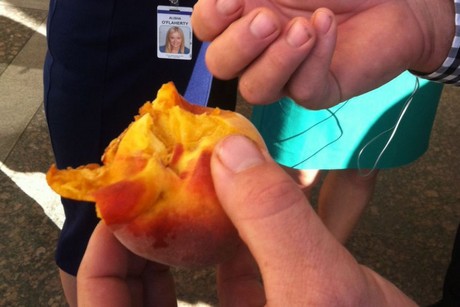 ustry has for years used the chemical Fenthion to keep fruit fly at bay. The pesticide was banned by the Federal Government last year after a study found it was a potential health hazard.
ustry has for years used the chemical Fenthion to keep fruit fly at bay. The pesticide was banned by the Federal Government last year after a study found it was a potential health hazard.The Opposition's Ken Travers said the decision had left the industry in crisis and that the State Government should be looking at other measures. "They have had their main weapon against fruit fly removed from them as a result of bans on the chemical Fenthion," he said. "What they now need from the Government is leadership and financial support to put in place alternatives for managing fruit fly."
Mr Travers said the State Government needed to work with industry to implement and fund an area-wide management plan. "That means ensuring that abandoned orchards are being treated [and] that we're releasing sterile fruit flies to keep down the growth of the fruit fly numbers," he said.
Perth Hills stone fruit grower Brett DelSimone said the threat to the Perth Hills stone fruit industry, which he estimated had a farm-gate value of $40 million, was dire. "It's probably the most dire that it's been in 50 years, ever since the introduction of Fenthion, which opened up a whole new range of possibilities of growing different crops in the Perth Hills," he said. "Now that product is under threat, there are not a lot of options left for growers."
He described crop losses of up to 50 per cent last year as "unsustainable".
"There is a very good chance that the Perth Hills industry will disappear, you're talking about a $40 million farm-gate value so by the time it moves through the economy, around $100 million worth of produce."
He said Fenthion was the only product that could effectively destroy maggots, but that the release of sterile insects could help bring population down. "Growers are keen to move away from traditional chemical usage, but we need a system to help us get there," he said.
A spokeswoman for WA Agriculture Minister Ken Baston said he met with a group of Perth Hills fruit growers today. The spokeswoman said it was agreed that the growers' group and the WA Department of Agriculture and Food WA would work to develop a solution, which might include forming a recognised biosecurity group.
"The days of using Fenthion are coming to an end because of safety issues identified," she said.





